Posts by Christopher Lochhead
200 Thinking About Thinking Is The Most Important Kind Of Thinking
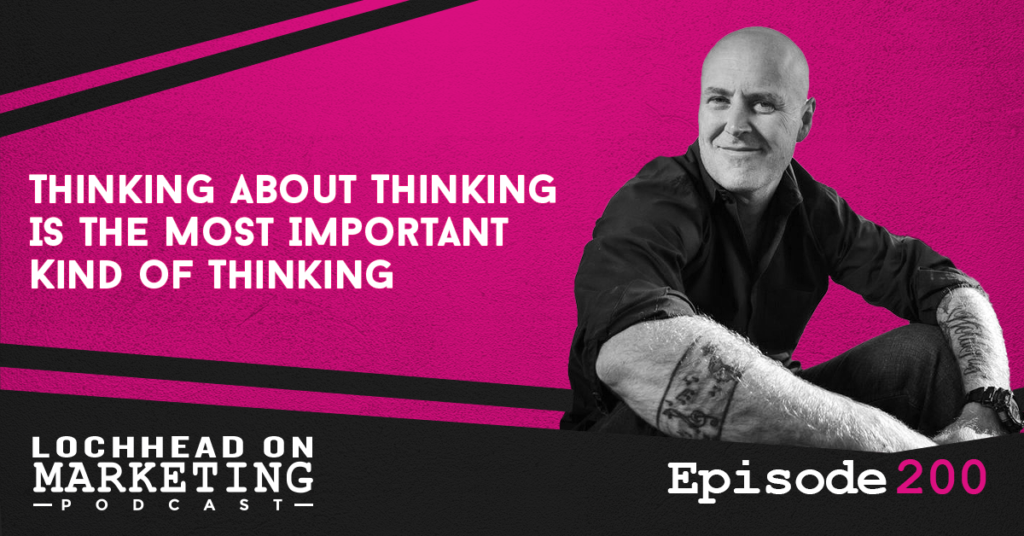
Podcast (lochheadonmarketing): Play in new window | Download (Duration: 17:26 — 12.0MB) | Embed
Subscribe: Apple Podcasts | Spotify | RSS | More
On this episode of Lochhead on Marketing, let’s talk about why thinking about thinking is the most important kind of thinking.
This isn’t just another buzz phrase; it’s a fundamental practice that can revolutionize the way we approach entrepreneurship, marketing, and business strategy. So we thought that it would be a good idea to refresh new listeners minds and remind the old heads why Context is always King.
Welcome to Lochhead on Marketing. The number one charting marketing podcast for marketers, category designers, and entrepreneurs with a different mind.
The Power of Context in Decision-Making
In the realm of business, context is everything. It shapes our discussions, influences our decisions, and ultimately determines the trajectory of our companies. It’s not just about the data or the trends; it’s about grasping the bigger picture and recognizing the underlying currents that drive market dynamics.
Most people, particularly those who are entrepreneurial, have a strong bias to action, diving right in and creating content without the context to support it. However, it does have it downsides sometimes.
“A strong bias to action means that sometimes, and I know I’ve been guilty of this more times than I will ever know, we spring to action without doing enough thinking. More importantly, without doing enough thinking and dialoguing around what the context is for whatever it is we’re talking about.”
– Christopher Lochhead
Rejecting the Premise: A Pathway to Innovation
One of the most exhilarating concepts we discussed was the power of rejecting the premise.
So often, we’re boxed in by traditional ways of thinking, by phrases and concepts that are accepted as industry standards. But what happens when we challenge those premises? When we refuse to accept the status quo? That’s when innovation truly happens.
By rejecting the premise, we open ourselves up to new possibilities, to the potential for creating entirely new categories and leading the market in directions it has never seen before.
Challenging Existing Contexts: The Forward-Thinking Mindset
A key takeaway from this discussion was the importance of challenging existing contexts. It’s easy to fall into the trap of backward thinking, of looking to past successes as a template for future endeavors.
However, the true forward-thinking entrepreneur knows that what worked yesterday might not work tomorrow. By constantly questioning and reevaluating the context in which we operate, we stay ahead of the curve and maintain a competitive edge.
To hear more about how thinking about thinking is the most important kind of thinking, download and listen to this episode.
Bio
Don’t forget to grab a copy (or gift!) of one of our best-selling books:
Snow Leopard: How Legendary Writers Create A Category Of One
The Category Design Toolkit: Beyond Marketing: 15 Frameworks For Creating & Dominating Your Niche
A Marketer’s Guide To Category Design: How To Escape The “Better” Trap, Dam The Demand, And Launch A Lightning Strike Strategy
 The 22 Laws of Category Design: Name & Claim Your Niche, Share Your POV, And Move The World From Where It Is To Somewhere Different
The 22 Laws of Category Design: Name & Claim Your Niche, Share Your POV, And Move The World From Where It Is To Somewhere Different**NEW!** The B2B Tech Marketer’s Guide To Category Design: How To Engineer Your Market, Find What Makes You Different, And Become A Category Queen
We hope you enjoyed this episode of Lochhead on Marketing™! Christopher loves hearing from his listeners. Feel free to email him, connect on Facebook, Twitter, Instagram, and subscribe on iTunes!
358 Unlocking Revenue: AI’s Predictive Power in Business with Clari CEO Andy Byrne
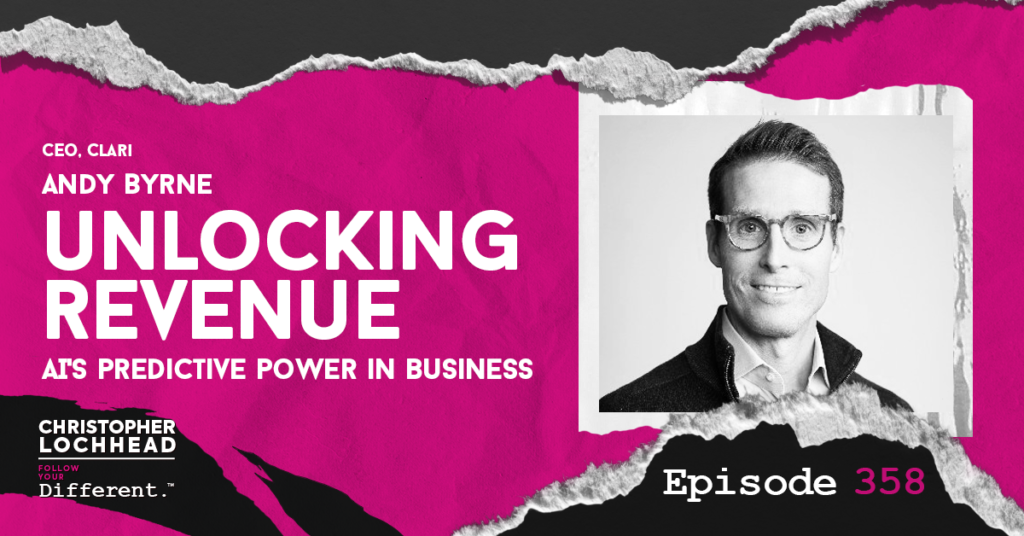
Podcast: Play in new window | Download (Duration: 52:29 — 36.0MB) | Embed
Subscribe: Apple Podcasts | Spotify | Pandora | RSS | More
Welcome to a special episode of Christopher Lochhead: Follow Your Different, where we dive deep into the intersection of artificial intelligence (AI) and business growth. Today, we have the pleasure of speaking with a visionary in the realm of AI and revenue generation, Andy Byrne.
Andy Byrne is the visionary CEO of Clari, a leading revenue operations platform. With a wealth of experience in the tech industry, Byrne has been instrumental in shaping Clari’s innovative approach to sales execution and forecasting.
You’re listening to Christopher Lochhead: Follow Your Different. We are the real dialogue podcast for people with a different mind. So get your mind in a different place, and hey ho, let’s go.
From Garage to Global: Clari’s Ascension
Andy takes us on a journey through Clari’s evolution, from its modest inception in a garage to becoming a powerhouse with over 700 employees and R&D centers across the globe. He shares the pivotal role of generative AI in accelerating business processes, enabling companies to swiftly create, convert, and close their sales pipelines.
Despite initial skepticism, Predictive AI has proven to be a game-changer for revenue leaders. Andy highlights how early predictions empower proactive decision-making and optimize capital deployment, crucial for managing expectations around revenue and earnings per share.
Andy Byrne on Uncovering Revenue Leaks with AI
We then discuss AI’s ability to identify and rectify revenue leaks. Andy provides tangible examples, such as neglected leads and overlooked targets, which can significantly impact a company’s bottom line. By harnessing AI, organizations can foster revenue collaboration and enhance productivity at all organizational levels.
“The process of running revenue is more of a technology game now than a sales game.”
– Andy Byrne
Predictive AI: Fostering Collaborative Conversations
Drawing parallels to the early days of SEO and network performance management, we delved into the concept of “signal” within AI. Clari’s AI is adept at analyzing signals from a myriad of sources, offering real-time insights that are instrumental in detecting revenue leaks and informing strategic decisions.
Andy recognizes how Predictive AI can spark these useful conversations. He stresses how these talks, where people compare their gut feelings with the predictions made by machines, can boost teamwork and help businesses thrive.
To hear more from Andy Byrne and how AI can help boost your company’s revenue, download and listen to this episode.
Bio
Andy Byrne, CEO of Clari, is a seasoned leader in the tech industry.
Andy Byrne is dedicated to revolutionizing revenue operations, championing innovation, and fostering collaboration within sales teams globally. His strategic vision has propelled Clari to the forefront of the industry, where it stands as a trailblazer in harnessing the power of Predictive AI for sales execution and forecasting.
Under his guidance, Clari continues to empower businesses to achieve unparalleled growth and success, setting new standards for excellence in revenue optimization and operational efficiency.
Links
Connect with Andy Byrne!
Clari.com | LinkedIn | Twitter/X
We hope you enjoyed this episode of Christopher Lochhead: Follow Your Different™! Christopher loves hearing from his listeners. Feel free to email him, connect on Facebook, Twitter, Instagram, and subscribe on Apple Podcast / Spotify!
199 What Apple’s $110 Billion Stock Buy-Back Means For The Category Queen | Pirates Perspective
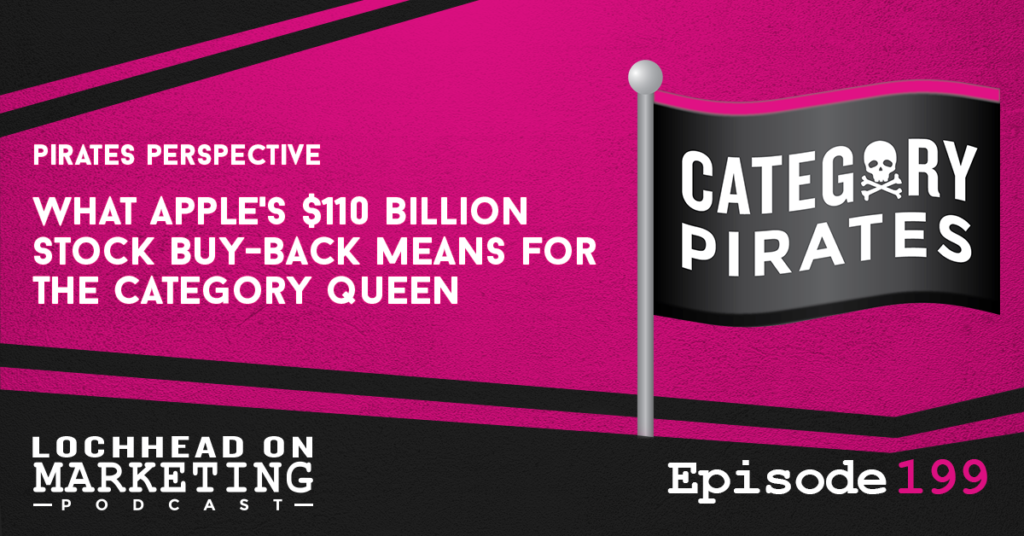
Podcast (lochheadonmarketing): Play in new window | Download (Duration: 18:55 — 13.0MB) | Embed
Subscribe: Apple Podcasts | Spotify | RSS | More
Today on Lochhead on Marketing, we want to share some insights from a riveting discussion we had with Eddie Yoon, our category pirate brother, about a monumental move by Apple.
We’re talking about a colossal $110 billion stock buyback and what it means for the tech giant’s innovation trajectory, particularly in the realm of artificial intelligence (AI).
Welcome to Lochhead on Marketing. The number one charting marketing podcast for marketers, category designers, and entrepreneurs with a different mind.
Apple’s Strategic Crossroads: Innovation or Shareholder Pleasing?
Apple’s decision to buy back stock is a strategic move that has raised eyebrows across the industry.
I’ve always been fascinated by the bold moves that define market leaders, but this move by Apple has us questioning: Is this a sign of maturity and stability, or a red flag signaling a lack of innovative vision?
Warren Buffett, a name synonymous with investment acumen, was famously tech-averse until Apple caught his eye. The staggering 95% retention rate of iPhone users and the undeniable addiction to Apple’s ecosystem reminded him of his investment thesis on Coca-Cola. But as Eddie and I discussed, there’s a nuance to Apple’s success under Tim Cook’s leadership. Despite the financial growth and profitability, the company has struggled to launch new categories—a hallmark of Apple’s DNA.
The Apple Watch: A Beacon of Innovation in the Cook Era
It’s not all a tale of caution, though. The Apple Watch stands out as a testament to Apple’s ability to innovate and create new categories even post-Steve Jobs. It’s a reminder that Apple still has the chops to redefine markets. But the question lingers: Is this enough to sustain Apple’s legendary status?
The crux of the discussion centered on the massive potential of AI, as we’re just at the dawn of what could be the most significant platform shift since the internet. With Apple’s deep pockets, one would expect a torrent of investments in AI, propelling the company to the forefront of this new frontier. Instead, the $110 billion stock buyback seems to suggest a different priority—short-term stock price over long-term category creation.
Microsoft’s Contrasting Strategy: A Global AI Chess Game
Contrast Apple’s strategy with Microsoft’s aggressive global AI investments, and you get a stark picture of two tech titans taking divergent paths.
Microsoft is placing strategic bets on AI across the globe, from the UAE to Malaysia and beyond, positioning itself as a leader in the next wave of technological revolution.
To hear more Pirate talk by Christopher Lochhead and Eddie Yoon, download and listen to this episode.
If you want to join in the discussion, subscribe to Category Pirates and find more Pirates Perspective buried around the beach.
Don’t forget to grab a copy (or gift!) of one of our best-selling books:
Snow Leopard: How Legendary Writers Create A Category Of One
The Category Design Toolkit: Beyond Marketing: 15 Frameworks For Creating & Dominating Your Niche
A Marketer’s Guide To Category Design: How To Escape The “Better” Trap, Dam The Demand, And Launch A Lightning Strike Strategy
 The 22 Laws of Category Design: Name & Claim Your Niche, Share Your POV, And Move The World From Where It Is To Somewhere Different
The 22 Laws of Category Design: Name & Claim Your Niche, Share Your POV, And Move The World From Where It Is To Somewhere Different
We hope you enjoyed this episode of Lochhead on Marketing™! Christopher loves hearing from his listeners. Feel free to email him, connect on Facebook, Twitter, Instagram, and subscribe on iTunes!
357 Crowning Achievements: Shante & Lauren’s Trailblazing Journey in Wig Rental Category Design with Shante Frazier and Lauren Mitchell of WellCapped
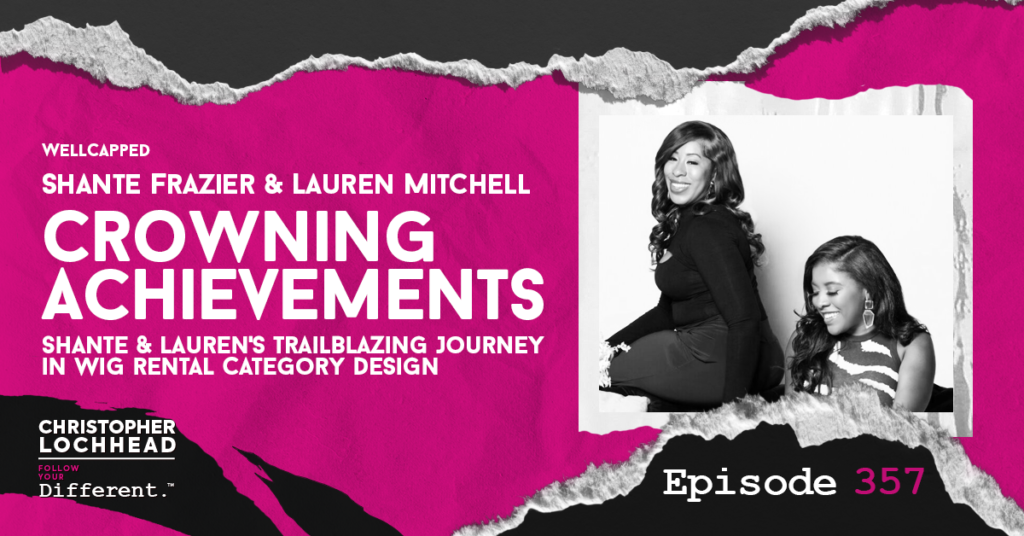
Podcast: Play in new window | Download (Duration: 1:06:28 — 45.6MB) | Embed
Subscribe: Apple Podcasts | Spotify | Pandora | RSS | More
On this episode of Christopher Lochhead: Follow Your Different, we have the pleasure of sitting down with two remarkable entrepreneurs, Shante Frazier and Lauren Mitchell, the co-founders of WellCapped.
In our conversation, we delved into the origins of their groundbreaking service, the hurdles they’ve overcome, and their ambitious vision for the future of the beauty industry.
Their journey is one of innovation, resilience, and a relentless pursuit of redefining beauty standards. You’re listening to Christopher Lochhead: Follow Your Different. We are the real dialogue podcast for people with a different mind. So get your mind in a different place, and hey ho, let’s go.
WellCapped: The Genesis of a Game-Changer
Shante and Lauren’s venture, WellCapped, is akin to Rent the Runway, but for wigs and hair extensions. This novel concept was born from a simple suggestion by Shante’s aunt and has since blossomed into a business that caters to a diverse clientele seeking quality and affordability.
Their personal experiences and corporate backgrounds have fueled their mission to democratize high-end wigs and hair extensions, making them accessible to all.
The beauty industry has seen a surge in the use of wigs and hair extensions, with technological advancements blurring the lines between natural and styled hair. Celebrities and influencers are challenging traditional beauty norms, and WellCapped is at the forefront of this shift, empowering customers to experiment with their looks without the hefty price tag.
The Entrepreneurial Leap
Shante recounts the poignant moment that transformed her hesitation into conviction. The idea of a rental service for wigs and hair extensions wasn’t just a business opportunity; it was a chance to support individuals undergoing chemotherapy by offering free memberships and support—a testament to the personal significance of WellCapped.
Transitioning from corporate America to entrepreneurship is no small feat. Shante and Lauren share their motivations and the challenges they faced along the way.
“When you see your customers telling you how our company has changed their lives, it gives you the fuel that you need to keep going on the bad days.”
– Lauren Mitchell of WellCapped
Eventually, Lauren’s layoff became a catalyst for her commitment to WellCapped, while Shante reflected on the naivety and learning curve of starting a new venture.
The Journey of Fundraising and Resilience
Raising funds for a startup is a daunting task, but Shante and Lauren’s determination was unwavering. They focused on aligning with investors who shared their vision, rather than convincing skeptics. Their commitment to excellence and continuous improvement has been a driving force behind their success.
Their participation in the Techstars program marked a pivotal chapter for WellCapped. The intensive accelerator experience honed their brand and helped shift customer perceptions about renting wigs—a concept that is now gaining traction and acceptance.
Shante emphasized the growing trend of viewing hair as a fashion accessory. WellCapped taps into this trend by offering a cost-effective way for consumers to express themselves through their hair, fostering a culture of experimentation and self-expression.
To hear more from Shante & Lauren and how they raised WellCapped from the ground up, download and listen to this episode.
Bio
Shante Frazier
Shante is a recent MBA graduate from NYU Stern, where she specialized in Marketing and Strategy. She graduated from Spelman College in 2012 with a BA in Economics.
Prior to coming to Stern, Shante worked at Progressive Insurance for 3 years in the Pricing and Competitive Intelligence departments while also serving as an officer in the Ohio Army National Guard.
Lauren Mitchell
Lauren is a experienced marketing enthusiast with a demonstrated history of providing direction in the consultant industry and building meaningful relationships.
She is a two-time graduate from Louisiana State University where she received her MBA focused in Management Consulting and a BS in Marketing.
Links
Connect with Shante & Lauren!
WellCapped: Website | LinkedIn | Instagram
Shante Frazier: LinkedIn
Lauren Mitchell: LinkedIn
We hope you enjoyed this episode of Christopher Lochhead: Follow Your Different™! Christopher loves hearing from his listeners. Feel free to email him, connect on Facebook, Twitter, Instagram, and subscribe on Apple Podcast / Spotify!
356 Unbroken Spirit: The Fight To Save American Wild Horses with Scott Wilson of American Wild Horse Conservation
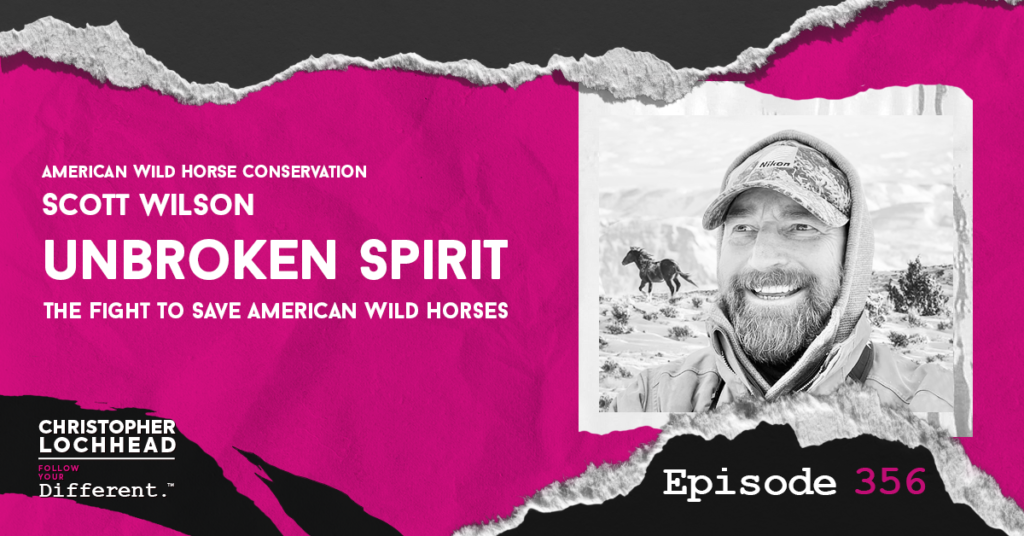
Podcast: Play in new window | Download (Duration: 58:41 — 40.3MB) | Embed
Subscribe: Apple Podcasts | Spotify | Pandora | RSS | More
Here at Christopher Lochhead: Follow Your Different, we’ve had the privilege of engaging in conversations that are not just thought-provoking, but also deeply impactful. On this episode, we sit down with Scott Wilson, the passionate co-founder of American Wild Horse Conservation, to discuss a topic close to both our hearts: the plight of America’s wild horses and the ongoing efforts to preserve and protect these magnificent creatures.
Scott Wilson is a renowned Colorado Nature Photographer and Communications Leader, whose journey took an unexpected turn when he discovered the plight of America’s wild horses. Scott became captivated by the freedom and majesty of the wild horses roaming the western United States. His realization that these iconic animals were facing threats to their survival inspired him to take action and co-found American Wild Horse Conservation. This non-profit organization is dedicated to preserving and protecting wild horses, which have played a pivotal role in the nation’s history and ecology.
This captivating conversation illuminates the plight of these majestic creatures, and the tireless efforts to secure their freedom and ensure their survival.
You’re listening to Christopher Lochhead: Follow Your Different. We are the real dialogue podcast for people with a different mind. So get your mind in a different place, and hey ho, let’s go.
Scott Wilson on the Historical Tapestry of America’s Wild Horses
The history of wild horses in the United States is as rich and complex as the country itself. Scott Wilson shares that there are approximately 65,000 wild horses roaming free across ten states in the western United States.
It’s also a little-known fact that all the world’s horses have their origins in North America, and they were reintroduced in the 1500s. These animals are not just a part of the natural ecology but are woven into the very tapestry of our nation’s history.
In 1971, the Wild Horse and Burro Protection Act was a promise made to these animals—a promise that we are duty-bound to uphold. As we delved into the significance of wild horses, it became clear that they are not just symbols of the wild but are key players in the ecological balance of our public lands.

Wild Blue Roan by Scott Wilson of the American Wild Horse Conservation
Scott Wilson on the Struggle for Space and Survival
Given these facts, it was unsettling to learn that wild horses are allocated a mere 2% of public lands. Contrary to popular belief, these horses are not in competition for building or economic development. In fact, only 1% of the nation’s beef is produced on these lands, debunking the myth that wild horses pose a significant threat to our economy.
However, the challenges they face are real and pressing. Competition with livestock, encroachment by oil and gas businesses, and government policies that often do more harm than good are just a few of the hurdles wild horses must overcome to survive.

Wild Pinto Stallion Picasso by Scott Wilson of the American Wild Horse Conservation
Nevada: The Heartland of Wild Horses
It’s a surprising fact that roughly half of the wild horse population in the US is concentrated in Nevada. This distribution has significant implications for conservation efforts and the management of these animals.
That being said, Scott Wilson’s initiative to buy back land and expand the habitat for wild horses is a beacon of hope. The acquisition of 3500 acres in Nevada and the establishment of a land trust are steps toward ensuring that wild horses and other wildlife can coexist peacefully.
To hear more from Scott Wilson and how American Wild Horse Conservation help protect these majestic creatures, download and listen to the episode.

Freedom by Scott Wilson of the American Wild Horse Conservation
Bio
A brand-builder and landscape photographer of twenty years, Scott Wilson found his conservation voice after a prolonged battle with stage 4 colon cancer refocused his lens on Colorado’s wildlife, leading to the life-changing discovery of a remote and mesmerizing herd of wild horses in Sand Wash Basin, on the border with Wyoming.
While an early photographic encounter with a wild tricolored pinto mustang named Picasso helped change the focus of Scott’s career as an artist, it was an impending federal roundup, threatening the very survival of the herd, that unlocked his voice as an advocate, and he has since campaigned for better outcomes for wild horses, behind and in front of the lens, both as a spokesperson and strategist for American Wild Horse Conservation, the nation’s leading wild horse conservation NGO.
Anger Management, a statement piece about the conservation challenges facing wild horses in the American west, earned Open Photographer of the Year and Natural World and Wildlife Awards in the 2022 Sony World Photography Awards, raising awareness of wild horse issues in more than 140 countries.
Scott is a contributor to We Animals Media, the world’s largest animal photojournalism agency, and his PhotoAdvocacy work has featured in local, national and international media, including the BBC, Daily Telegraph, Nat Geo España, GQ Italia, Advanced Photographer, Denver Post, 5280, 303, Westword and Colorado Life Magazine.
Scott operates Colorado’s Wild Horse Art Gallery within Gallery 6 – voted Westword Denver’s Best Photography Gallery in 2023 – in the heart of Denver’s Art District, where he also serves as Art District President.
Links
Connect with Scott Wilson
American Wild Horse Conservation | Instagram | Facebook
Check out more images of these majestic wild horses at the Photo Advocacy website & their Instagram!
We hope you enjoyed this episode of Christopher Lochhead: Follow Your Different™! Christopher loves hearing from his listeners. Feel free to email him, connect on Facebook, Twitter, Instagram, and subscribe on Apple Podcast / Spotify!
355 How To Win On Shark Tank, Create A Category, & Save Billions of Butts with Sean Riley, Chief Dude at DUDE Wipes
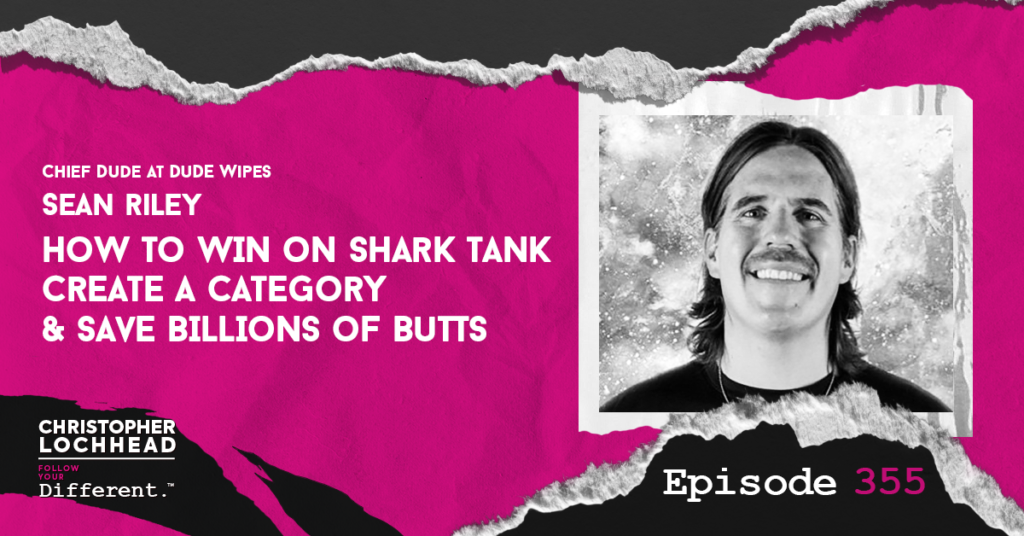
Podcast: Play in new window | Download (Duration: 1:10:53 — 48.7MB) | Embed
Subscribe: Apple Podcasts | Spotify | Pandora | RSS | More
On this episode of Christopher Lochhead: Follow Your Different, we have the pleasure of welcoming Sean Riley, the co-founder of Dude Wipes.
For those unfamiliar with it, Dude Wipes is a brand that has revolutionized the concept of personal hygiene with a superior alternative to traditional toilet paper. Sean shares the story of how Dude Wipes catapulted to legendary success, including securing a deal with Mark Cuban on Shark Tank and being recognized as one of the top five greatest Shark Tank entrepreneurs.
Our conversation was not only enlightening, but also a testament to the power of innovation and strategic category design in entrepreneurship.
You’re listening to Christopher Lochhead: Follow Your Different. We are the real dialogue podcast for people with a different mind. So get your mind in a different place, and hey ho, let’s go.
Sean Riley on Disrupting the Market with Practical Innovation
The conversation starts off with Sean’s mustache and how well everyone’s taking to it. Sean’s distinctive mustache isn’t just a personal style choice; it’s become a branding asset for Dude Wipes. Pivoting from that, Sean discusses the significance of the brand and its deep resonance with consumers. The name “Dude Wipes” itself is a stroke of genius, encapsulating humor, authenticity, and a bold approach to male hygiene.
The conversation then veered towards the practicality of Dude Wipes. Sean emphasizes the universal dissatisfaction with traditional toilet paper and the need for a better solution, especially for men on the go. He explores the potential for Dude Wipes to become as ubiquitous as toilet paper, with the aim of making the product more accessible and convenient for consumers.
Drawing parallels with Gojo Industries, the category king of liquid soap and Purell hand sanitizer, Christopher highlights the reframing of the problem and the potential for Dude Wipes to create a new category in the hygiene space. Despite initial skepticism, Sean’s commitment to disrupting the toilet paper market remains unwavering.
Sean Riley on Overcoming Skepticism and Embracing Category Potential
In the early days, Dude Wipes faced challenges and skepticism. However, Sean and his team were confident in their product’s appeal to men.
They understood that by creating a better product, they could carve out a new space in the male market. Sean’s insights on the importance of category potential and market dynamics were particularly enlightening, emphasizing the significance of entering a growing category with unique offerings.
The Shark Tank Effect: A Pivotal Moment for Dude Wipes
Sean provides an overview of Dude Wipes’ impressive sales figures and distribution channels, highlighting the company’s organic growth and resourceful brand-building approach. Reflecting on their Shark Tank experience, Sean recounts the unexpected turn of events when Mark Cuban offered them a deal, marking a pivotal moment for the company.
Sean’s passion and determination were palpable as he recounted the journey of building Dude Wipes and overcoming challenges to achieve success.
To hear more from Sean Riley and to receive valuable insights into entrepreneurship, category design, and the power of believing in a product’s potential, download and listen to this episode.
Bio
Sean Riley is the co-founder and driving force behind Dude Wipes, a groundbreaking brand in personal hygiene. With a business degree in hand, Sean teamed up with his childhood friend to challenge conventional notions of men’s grooming. In 2010, they launched Dude Products, introducing flushable wipes tailored for men, a concept that resonated with consumers seeking convenient, effective, and masculine alternatives to traditional toilet paper.
Sean’s leadership propelled Dude Products from a garage startup to a global phenomenon, with a diverse product line available in major retailers worldwide. His dedication to quality, innovation, and customer satisfaction solidified Dude Wipes’ position as an industry leader. Beyond business, Sean advocates for men’s health and wellness, leveraging Dude Wipes’ platform to promote positive habits and destigmatize personal hygiene.
With relentless drive and passion, Sean continues to inspire others to embrace their dudehood and live life to the fullest.
Links
Connect with Sean Riley!
We hope you enjoyed this episode of Christopher Lochhead: Follow Your Different™! Christopher loves hearing from his listeners. Feel free to email him, connect on Facebook, Twitter, Instagram, and subscribe on Apple Podcast / Spotify!
198 Complexity Is The Enemy of Revenue: Why It’s Time to Shave The Marketing Dog
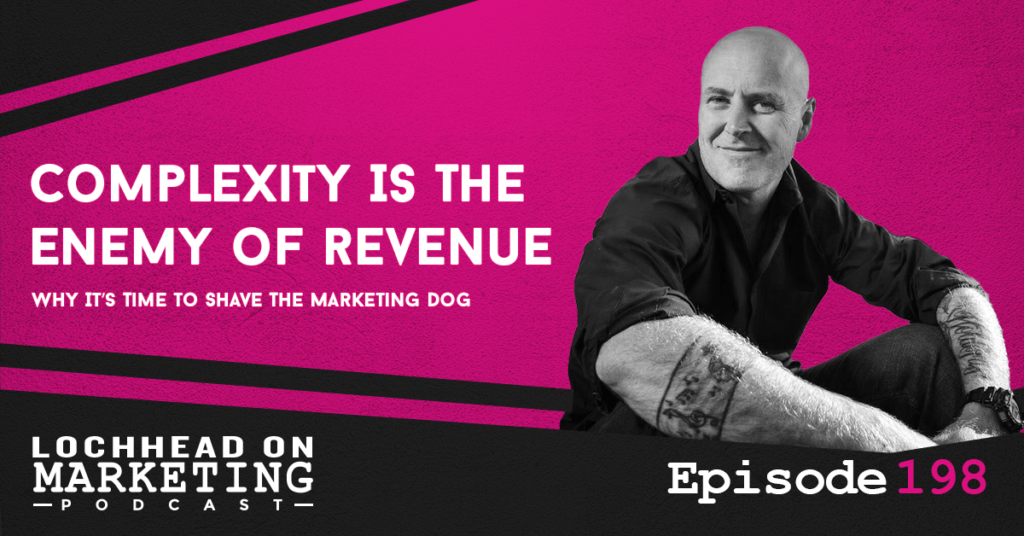
Podcast (lochheadonmarketing): Play in new window | Download (Duration: 14:06 — 9.7MB) | Embed
Subscribe: Apple Podcasts | Spotify | RSS | More
On this episode of Lochhead on Marketing, it’s time again to shave that Marketing Dog with Christopher Lochhead.
If you’re an avid listener of the podcast, you probably think you’re experiencing déjà vu. But we think that people still don’t get this simple concept, that it merits a replay. It is also a good reminder for others who may be falling into the trap of overcomplicating their marketing strategies.
So strap in, and get ready for some timeless advice from yours truly.
Welcome to Lochhead on Marketing. The number one charting marketing podcast for marketers, category designers, and entrepreneurs with a different mind.
Quality Over Quantity: A Bruce Lee Philosophy in Marketing
In the world of marketing, there’s a tendency to equate being busy with effectiveness. However, Christopher likens this to a young fighter who is all showboating but lacks the strategic focus to win. This fighter often ends up being knocked out by a more experienced opponent who understands that precision and strategy trump frantic activity. This analogy perfectly encapsulates the inverse relationship between activity and results in marketing.
The pressure to be omnipresent in the marketing world is immense. Marketers are often told they need to be on every channel, churning out content at an unsustainable pace. But Christopher challenges this notion with a powerful quote from martial arts legend Bruce Lee:
“I fear not the man who has practiced 10,000 kicks once, but I fear the man who has practiced one kick 10,000 times.”
This philosophy is a stark reminder that quality and impact should always take precedence over quantity.
Shaving the Marketing Dog: The Art of Elimination
One of the strategies Christopher advocates for is “shaving the dog,” a metaphor for the practice of eliminating the unnecessary to focus on what truly matters. By force ranking the critical components of a campaign and rigorously evaluating which elements have the maximum impact, marketers can streamline their efforts for better results.
“Shave the dog. Shave that doggy down. Practice getting everything out. Consider getting even more radical.”
– Christopher Lochhead
Thinking Wrong to Do Right
Innovation in marketing often requires us to “think wrong,” to consider what is 180 degrees from what everyone else would do. This approach fosters creativity and differentiation, setting the stage for truly legendary marketing campaigns.
“I learned everything I know about design from a couple of legendary designers and one of them is John Bielenberg. He’s an incredible business and corporate marketing designer. He has a perspective; he calls thinking wrong. The idea is this, when you do anything creative, ask yourself ‘what is 180 degrees from what everybody else would do? What is wrong? What would be the wrong way to go do this?’”
– Christopher Lochhead
This line of thinking also allows you to pursue options that multiply outcomes, as you can sift through the “wrongs” and find those that were rejected, not because it is inherently wrong, but either be not viable in the past, but now doable in our current technology or network.
To know more why Complexity Is the Enemy of Revenue and Why It’s Time to Shave the Marketing Dog, download and listen to this episode.
Bio
Don’t forget to grab a copy (or gift!) of one of our best-selling books:
Snow Leopard: How Legendary Writers Create A Category Of One
The Category Design Toolkit: Beyond Marketing: 15 Frameworks For Creating & Dominating Your Niche
A Marketer’s Guide To Category Design: How To Escape The “Better” Trap, Dam The Demand, And Launch A Lightning Strike Strategy
 The 22 Laws of Category Design: Name & Claim Your Niche, Share Your POV, And Move The World From Where It Is To Somewhere Different
The 22 Laws of Category Design: Name & Claim Your Niche, Share Your POV, And Move The World From Where It Is To Somewhere Different**NEW!** The B2B Tech Marketer’s Guide To Category Design: How To Engineer Your Market, Find What Makes You Different, And Become A Category Queen
We hope you enjoyed this episode of Lochhead on Marketing™! Christopher loves hearing from his listeners. Feel free to email him, connect on Facebook, Twitter, Instagram, and subscribe on iTunes!
354 Sweat, Barriers, and the Birth of BODi: How Carl Daikeler Defined a New Fitness Category
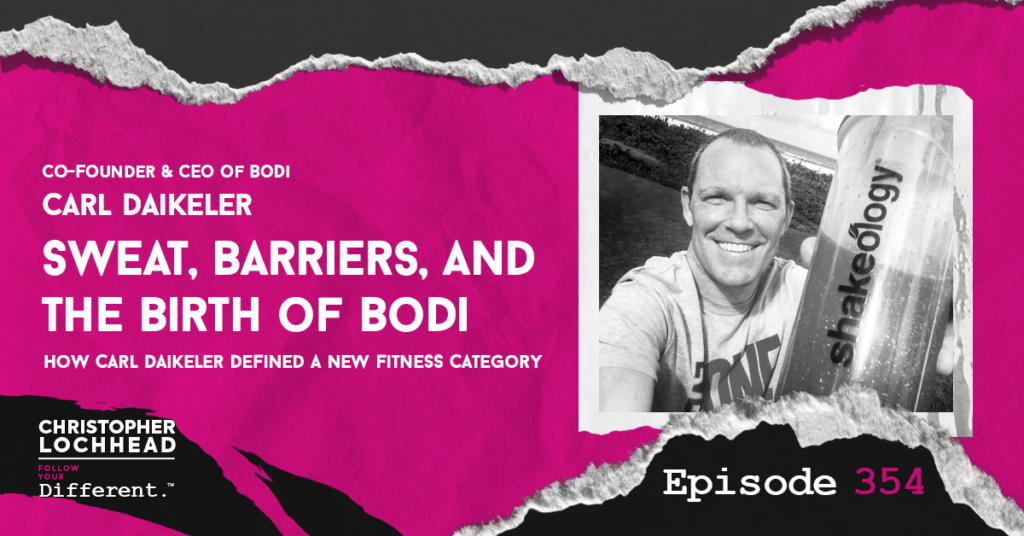
Podcast: Play in new window | Download (Duration: 1:08:54 — 47.3MB) | Embed
Subscribe: Apple Podcasts | Spotify | Pandora | RSS | More
On this episode of Christopher Lochhead: Follow your Different, we have a conversation with Carl Daikeler, the visionary CEO of BODi (formerly known as Beachbody).
We explore Carl’s remarkable journey in the fitness industry, beginning with the inception of the eight-minute abs video series—a concept that sprang from his own need for a quick and effective workout solution.
Carl’s story is not just about the creation of a fitness program; it’s about identifying a gap in the market and filling it with innovation. The eight-minute abs series not only became a household name but also gained unexpected fame with its mention in the movie “Something About Mary.” If you’re interested to learn more, consider giving this episode a try.
You’re listening to Christopher Lochhead: Follow Your Different. We are the real dialogue podcast for people with a different mind. So get your mind in a different place, and hey ho, let’s go.
Carl Daikeler on the Power of Media in Fitness
Carl shares the challenges and triumphs of launching other renowned fitness programs like Power 90 and P90X. He emphasizes the crucial role of media in delivering fitness instruction and the concept of structured home fitness. Reflecting on the success of P90X, Carl reveals the strategic thinking behind creating new fitness programs, such as Insanity, and the lessons learned along the way.
The impact of Carl’s fitness programs on individuals is profound, to say the least. They offer a sense of accomplishment and success to those who may have struggled with traditional gym environments. This, in turn, sheds light on the marketing and strategic decisions that propelled these programs to success and how Beachbody evolved into a digital powerhouse.
The Evolution of Fitness: From Products to Subscriptions
In the ever-changing landscape of the fitness industry, Carl explains the shift from selling products to embracing a subscription model. In fact, BODi has successfully transitioned to this model, boasting over a million subscribers.
However, the journey hasn’t been without its challenges, such as subscription fatigue. As such, Carl highlights the importance of evolving the business model to include digital program purchases alongside subscriptions.
The unique features of their digital platform, such as virtual trainers who can make real-time corrections for dozens of participants, also helped ensure a high-quality experience. This flexibility extends to allowing users to download programs for offline use, catering to the modern consumer’s need for convenience and customization.
Owning the Morning and the Holistic Approach to Health
The conversation took a personal turn as Carl shares his morning routine, which includes a health shot and Shakeology. He stressed the significance of starting the day with healthy habits to set the tone for overall well-being.
This led to the discussion of a controversial topic in weight loss pharmaceuticals, like Ozempic, and the dangers of relying on drugs without making necessary lifestyle changes. Carl advocates for a holistic approach to health, emphasizing the need to build and preserve muscle for long-term vitality.
They ponder whether people use these drugs as a kickstarter for a healthier lifestyle or merely as a shortcut. Carl introduces the concept of “health esteem,” advocating for building a lifestyle centered around health and activity rather than focusing solely on weight loss.
To hear more from Carl Daikeler and how to build up your body the healthy way, download and listen to this episode.
Bio
Carl Daikeler is the visionary CEO and Co-founder of BODi, a revolutionary health and wellness company. With over two decades of experience in the fitness industry, Carl is on a mission to transform lives through innovative approaches to exercise and nutrition.
Carl’s journey began with a passion for helping others achieve their fitness goals. Drawing from his own struggles with weight management and a desire to make a difference, he co-founded BODi to provide people with accessible and effective solutions for sustainable health transformations.
Under Carl’s leadership, BODi has become a beacon of inspiration, empowering individuals worldwide to take control of their well-being. His relentless dedication to creating impactful programs and fostering a supportive community has earned him recognition as a trailblazer in the industry.
Beyond his role at BODi, Carl is a fervent advocate for health advocacy and philanthropy. He continuously strives to make a positive impact on society by promoting healthy lifestyles and supporting charitable initiatives.
With Carl Daikeler at the helm, BODi is not just a company; it’s a movement towards a healthier, happier world. Join us as we embark on this transformative journey together.
Links
Connect with Carl Daikeler!
LinkedIn | Instagram | Twitter / X | Facebook
We hope you enjoyed this episode of Christopher Lochhead: Follow Your Different™! Christopher loves hearing from his listeners. Feel free to email him, connect on Facebook, Twitter, Instagram, and subscribe on Apple Podcast / Spotify!
353 Russia Could Have Been Legendary: Russia’s Turbulent Transition with Kevin Maney, NYT Bestselling Author of Red Bottom Line
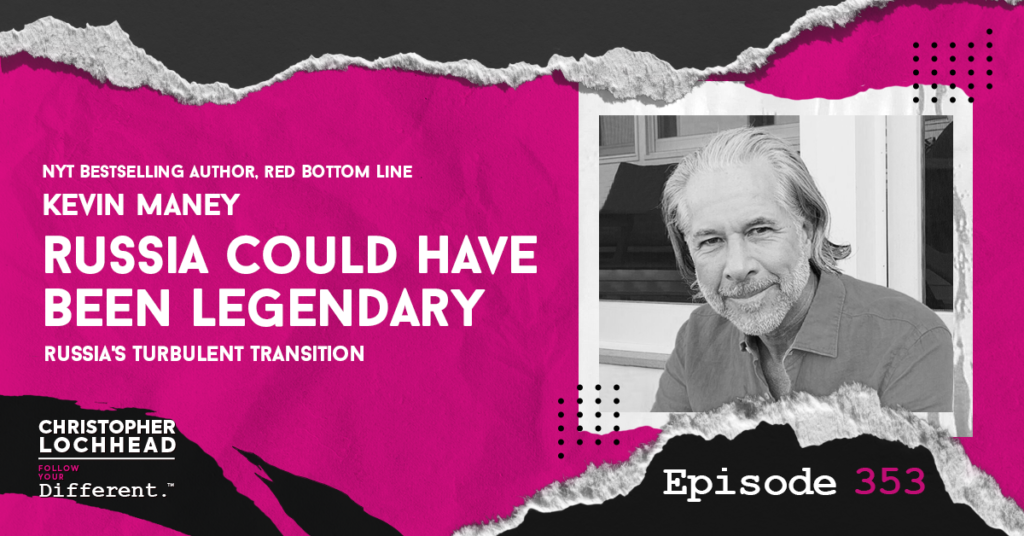
Podcast: Play in new window | Download (Duration: 1:09:19 — 47.6MB) | Embed
Subscribe: Apple Podcasts | Spotify | Pandora | RSS | More
On this episode of Christopher Lochhead: Follow Your Different, we are joined again by a dear friend, Kevin Maney, as he shares stories about the missed opportunities for innovation after Soviet Union’s fall.
Kevin Maney has a new book out called Red Bottom Line, wherehe tells his firsthand experience as a young USA Today reporter in Russia during the time. From the optimism of Gorbachev’s era to the disillusionment under Putin, Christohper and Kevin also explore Russia’s technological transformation, societal issues and geopolitical impact.
You’re listening to Christopher Lochhead: Follow Your Different. We are the real dialogue podcast for people with a different mind. So get your mind in a different place, and hey ho, let’s go.
Kevin Maney on the Journalism in Russia during the late 80s and early 90s
Kevin starts off the conversation with a description of the conditions in Russia before, during, and after the fall of the Soviet Union. He describes when Mikhail Gorbachev started loosening restrictions and allowing more foreign correspondents into Russia, which allowed journalists like Kevin to make it to Russian soil as early as 88-88.
Though some restrictions were lifted, Kevin recalls that they still had to jump through so many hoops just to get there, as there aren’t exactly direct routes or flights going from America to Russia at the time.
At this point in time, a lot of Americans and other Westerners were flocking to Russia, as demand for common consumer products skyrocket. Things like toothpaste and deodorant were being sold left and right, things that weren’t originally available locally. Kevin observed this trend and proposed to his editor to let him cover this economic and financial phenomenon that is happening in the Soviet Union.
Kevin Maney on Life in Russia during Economic Hardship
As Kevin recalls the situation then, he saw a country that was on its last legs, and its people trying desperately to live as normal as they could. He observed certain stores that only allowed foreigners or people with non-local currencies to shop, as they know it had more buying power in the long run.
Local residents were crowding other stores, either to purchase clothing items or to replenish their essential supplies. In department stores, shelves were nearly bare, with only toys and luxury items remaining unsold. Everyone was scooping up anything they could find.
Seeing all that in contrast to people’s lives in America was disheartening, to say the least.
The Opening of the First McDonalds in Russia during the 90s
Given all that, Kevin still saw some hope for the country as they start rebuilding themselves from within. That, and all the companies that are now flooding into Russia to help supplies their needs and ideally, boost their economy.
One such company was McDonalds, who Kevin has a fond story to tell. He shares that on one of his trips back to Russia, he just happened to be on the same flight as George Kohan, the biggest McDonalds franchisee in Canada. George was on his way to Moscow to check his plans to build a branch there, which eventually became the first of many McDonalds built in Russia.
Kevin got to talk with George Kohan on how things were going with building a business on foreign soil, and the procedures and machinations he had to go through to finally get approved to open his business there.
To hear more from Kevin Maney and his stories from the redeveloping Russia in the 90s, download and listen to this episode.
Bio
Kevin Maney is cofounder of Category Design Advisors, where he works with CEOs and executive teams to develop and execute strategies to design and dominate markets. He is also a multi-time bestselling author and journalist who writes about technology and society.
His most recent book, UnHealthare: A Manifesto for Health Assurance, was co-authored with venture capitalist Hemant Taneja and Jefferson Health CEO Steve Klasko. It came out in 2020, and tees up how healthcare will evolve in the post-Covid era.
His previous book, Unscaled: How AI and a New Generation of Upstarts are Creating the Economy of the Future, was co-authored with Hemant Taneja and came out in 2018.
His book Play Bigger: How Pirates, Dreamers and Innovators Create and Dominate Markets (Harper Business, 2016), is a collaboration with Silicon Valley veterans Al Ramadan, Dave Peterson and Christopher Lochhead. The book introduces business to the idea of category design and gave birth to the advisory firm Category Design Advisors, where I’m now a partner.
Other Works
He co-authored, with TIBCO CEO Vivek Ranadive, The Two-Second Advantage: How We Succeed by Anticipating the Future…Just Enough. Merging brain science and computer science, it was a 2011 New York Times bestseller, and predicted much of the conversation we’re now having about artificial intelligence.
He also co-wrote Making the World Work Better, which marked IBM’s centennial in 2001. More than 600,000 copies are in print in a dozen languages.
His other books include Trade-Off: Why Some Things Catch On, and Others Don’t, The Maverick and His Machine: Thomas Watson Sr. and the Making of IBM and Megamedia Shakeout.
Over the years, he’s been a contributor to Fortune, The Atlantic, Fast Company and ABC News, among other media outlets. He was a contributing editor at Conde Nast Portfolio during its brief run from 2007 to 2009. For 22 years, he was a columnist, editor and reporter at USA Today.
He’s appeared frequently on television and radio, including CNN, CBS Sunday Morning and NPR, and lectured at conferences and universities, including New York University, UNC in Chapel Hill, and his alma mater, Rutgers.
Kevin also plays music with other New York rockers in a band called Total Blam Blam.
Links
Follow Kevin Maney today!
Website: KevinManey.com | CategoryDesignAdvisors.com
LinkedIn: in/KevinManey | company/CategoryDesign
Facebook: fb.com/CategoryDesign
Twitter: @KManey | @CD_Advisors
Instagram: @CategoryDesign
Check out his new book: Red Bottom Line
We hope you enjoyed this episode of Christopher Lochhead: Follow Your Different™! Christopher loves hearing from his listeners. Feel free to email him, connect on Facebook, Twitter, Instagram, and subscribe on Apple Podcast / Spotify!

